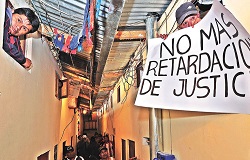A new report details some of the problems facing Bolivia’s prison system, and examines some of the challenges policy makers have confronted in their efforts to reform it.
Overcrowding is at critical levels in Bolivian penitentiaries, according to a report by the Andean Information Network (AIN). With its prison system at well over 250 percent of total capacity, Bolivia has the fifth-worst overcrowding situation in Latin America after Haiti, El Salvador, Guatemala and Venezuela.
Much to blame is Bolivia’s pervasive use of pre-trial detention, for which it has the second-highest rate in the region after El Salvador, according to the report.
In 2015, 69 percent of prisoners were awaiting trial. Prosecutors request pre-trial detention in up to 96 percent of preliminary hearings in Santa Cruz department, the report states. And according to AIN, the majority of outstanding cases take between two and three years to be resolved.
SEE ALSO: InDepth: Prisons
Bolivia’s prison population has nearly doubled since 2008, reaching more than 14,000 in 2016, according to figures cited by AIN. Of those detained, some 20 percent are reportedly behind bars due to narcotics-related offenses under the country’s drug regime, known as Law 1008.
The report argues that the extensive use of incarceration, including pre-trial detention, is perpetuated by the fact that the majority of Bolivians prefer punishment to preventative strategies against crime, according to a 2014 survey.
“Bolivians generally see prison as the best way to solve citizen insecurity, with little confidence in policies that prevent crime or encourage prisoner rehabilitation,” the report reads.
Indeed, Bolivian citizens have some of the highest perceptions of insecurity despite living in one of the least violent countries in the region.
Bolivian jails also suffer from poor conditions as well as untrained and corrupt prison staff, and nearly half of Bolivia’s juvenile inmates are being held in adult prisons, according to AIN.
InSight Crime Analysis
Prison systems afflicted by overcrowding, weak state authority and a lack of resources can provide fertile ground for inmates to set up their own governance systems. As has been the case in Bolivian jails, this allows the most powerful detainees to establish laws, execute justice and control illicit economies, like charging other inmates fees for services and benefits.
Still, the administration of President Evo Morales has made efforts to ameliorate the prison situation. The AIN report highlights a 2014 Penal Decongestion Law that limited the application of pre-trial detention, and is at least partly behind a drop in pre-trial detention rate from 85 percent in 2012 to 69 percent in 2015. Under Morales there have also been a number of amnesty initiatives, and from 2016 a penal code reform made preventive detection the exception rather than the rule, the report notes.
SEE ALSO: Coverage of Bolivia
But past penal reforms have only resulted in short-term drops in the prison population before being reversed as a result of negative public opinion, suggesting that the Bolivian government will have to work on general perceptions of punitive justice if any new initiatives are to be successful.

